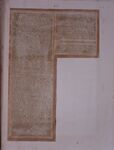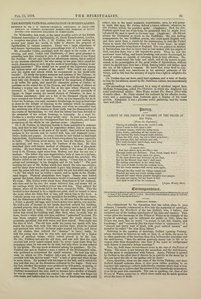The British National Association of Spiritualists
Reception to Dr. J. M. Peebles—spiritual phenomena in India—the efficacy of cursing—exorcising spirits—the exercise of occult powers—the religious influence of spiritualism.
On Wednesday, last week, at the usual monthly soiree of the British National Association of Spiritualists, 38, Great Russell-street, London, a reception was given to Dr. J. M. Peebles, who is now making his second tour round the world, in order to observe the progress of Spiritualism in various countries. There was a large attendance of well-known Spiritualists, and the proceedings were of a lively nature.
Mr. Alexander Calder, president, took the chair in the course of the evening, and said: Ladies and Gentlemen,—I have great pleasure in attending here this evening to join in a cordial welcome to our friend Dr. Peebles. He not only merits our affectionate esteem, but is entitled to our warmest admiration; for who among us has gone twice round the world, disseminating at each step the seeds of knowledge, relating to our highest interests? Who would not be proud of his experience among the various races and peoples of the earth? Who would not rejoice over the sights and scenes which he encountered on his world-wide travels? To study the quaint manners and customs of the Chinese; to revel in the clove fields of Malacca; to chop logic with the Brahmans at their holy city, Benares; to test the power of the magicians of Madras; to sit under the palm, and scent the cinnamon groves of Ceylon; to meditate on the sacred fire of the Parsees, and their tombs of silence at Bombay; to peep into the Red Sea at the spot where Pharaoh was drowned; to climb up and speculate on the wonderful pyramids of Egypt; to linger among the sacred shrines of Palestine, so dear to Christian association: such are a few of the thousand objects which have occupied our friend’s attention. Now, as it is impossible for us to follow his footsteps over such extensive wanderings, we may at least hope to share in the delight of listening to the lectures which he purposes from time to time to give on these themes, and when we remember that the crowning aim of his mission to those lands was the dissemination of the truths of Spiritualism, we feel that his labour has been devoted to the extension of the richest blessings to humanity. In a word Dr. Peebles is a worker whom all may safely envy. In your name, I greet him heartily; and may the Omnipotent bless him with health, and make prosperous all his efforts in our glorious cause. (Applause.)
Dr. J. M. Peebles, in returning thanks to those assembled to welcome him, said that he had long felt an inspiration within him to carry the truths of Spiritualism to all parts of the world; that had been his main purpose in his travels, and he carried with him, and scattered every-where, books and papers. In every country he had visited he had found Spiritualists. Spiritualism he had found everywhere, but more especially in India. The Chinese loved money more than the Hindoos, were not so spiritual, and were, in short, the Yankees of the East. He then described their well-known method of obtaining a kind of planchette writing. He next stated that an Irish family, of the name of Kelley, lived at St. Thomas, eight miles from Madras, and that the son was a medium. The father was once supervising a body of men on a railway, when he lost patience with a lazy Hindoo, and struck him severely. The Hindoo called on his God to curse him, saying, “Curse him in his out-goings and incomings! in his thoughts, and in his body!” The next morning the arm of Mr. Kelley which had struck the man was swollen, and for about three weeks thenceforth it gave him intense pain. All at once the pains left him, and the same night his son had what was called “a fit,’’ but which was in reality a trance, and he spoke in the Hindustani tongue. Physical phenomena then began. Stones were hurled against the house, dishes and furniture would occasionally slide around the room. Mrs. Kelley wrote about these disturbances to her- husband, who then sent for his son; the noises followed him, and stones fell on the carriage while his brother-in-law was with him. They entered the library, where all the books fell to the floor, except the Bible. This the brother-in-law deemed to be a significant point, until he turned to leave the room, when the Bible flew at him, and struck him in the back. A Catholic priest was sent for, who sprinkled the building with holy water, but the disturbances did not stop. Next, an old man from the mountains, a Fakir, a ghostly old sage, said to have power over spirits, was sent for. He took a pot of incense in his hands, marched around the building, chanted prayers, then put his hand on the young man’s head, and told him to fast and to bathe. Next night the old man told the youth to follow him round the building until after dark, when he made him sit down, threw a white cloth over him, and then “pathetised” his head. He also burnt camphor and frankincense, made the youth change his garments, sprinkled him with water, and then retired. Next night was the time of trial. The old man made the young one march with him round the house, then took him into a private room, where he washed and anointed him with oil; he burnt paper around his body, and burnt all his clothes, then ordered the “demons” to leave; lastly, he told the young man that he was safe, and surrounded by a higher order of spiritual beings, which indeed proved to be the case, He (Mr. Peebles) had met the old man, and was told that the aged exorcist had never tasted animal food j he never came down from the mountains when he was sent for by men, but only when he was ordered by his spirits. He was much in demand among the populace. He (Dr. Peebles) also met in Madras a man, a native of the Brahmanical caste, who professed to understand the occult sciences. He took him into a room in which he (Dr. Peebles) felt a sort of benumbment, and the occultist told him that he could “will” a ball of glass and other things to move about. He pointed with his finger at the ball, and it rolled this way and that way, in the directions indicated by his finger. Such was the fact, whether the motion were produced by will-power, or spirits, or other means. The Tamil people were easily mesmerised; he (Dr. Peebles) mesmerised one man until he became but a shadow of himself, he was so completely under his control; he could make him forget his own name, and believe that he was the Duke of Buckingham, and could subject him to the usual mesmeric experiments; once, by will-power he made this man, Mr. Patina, deliver a trance address; whatever he (Dr. Peebles) willed, the sensitive spoke. (Applause.) Had his (Dr. Peebles) spirit been out of his body, he presumed that he might have influenced the man to speak in the same way. (Applause.) He did not admire the Brahmans so much as the Buddhists. He was making arrangements for two Buddhist priests, who could speak English well, and were more than a match for the missionaries, to visit the United States to teach the Christians there to lead better lives; he might afterwards possibly bring them to England. His own position in relation to Spiritualism was that he knew that he had spoken with the angels of God, and that there was a life beyond the grave. When he saw the mourners’ tears falling, and hearts breaking, and people discouraged, he knew of nothing so capable of relieving them in their affliction. He, therefore, consecrated his body and mind, and all the powers he possessed, to the promulgation of the great truths of Spiritualism, without which he should have been but a Deist, floating hither and thither upon the sea of life without a compass. He knew that every deed he committed upon earth was interwoven in his spiritual garments of the future, and he felt that the ministry of angels was a light to enlighten the world.
Dr. Peebles then sat down amid loud applause, and a vote of thanks to him for his address, moved by Mr. Parkinson Ashton, was unanimously accorded.
The proceedings were enlivened by a song of spiritual import from Madame Schneegans, called The Chorister, in which she displayed her usual professional ability. Miss Waite recited The Raven (Poe) with dramatic effect. Mr. Dietz amused the audience by his effective recitations, and a gentleman from Australia gave a display of his vocal powers. Altogether it was a pleasant social gathering, and the rooms were well filled.
Editor's notes
- ↑ The British National Association of Spiritualists by unknown author, London Spiritualist, No. 286, February 15, 1878, p. 81
Sources
-
London Spiritualist, No. 286, February 15, 1878, p. 81


